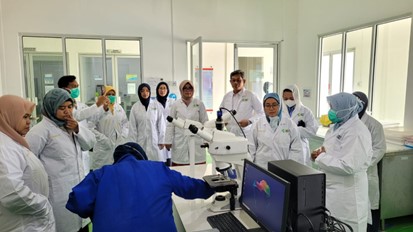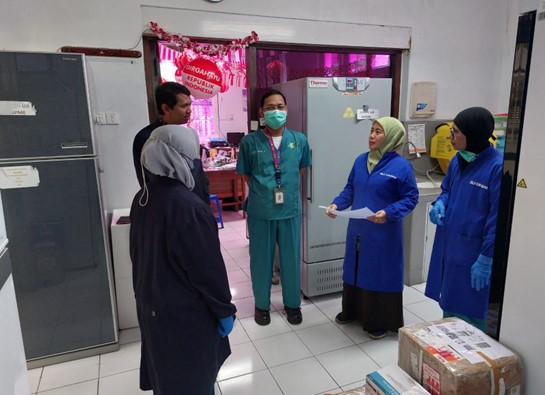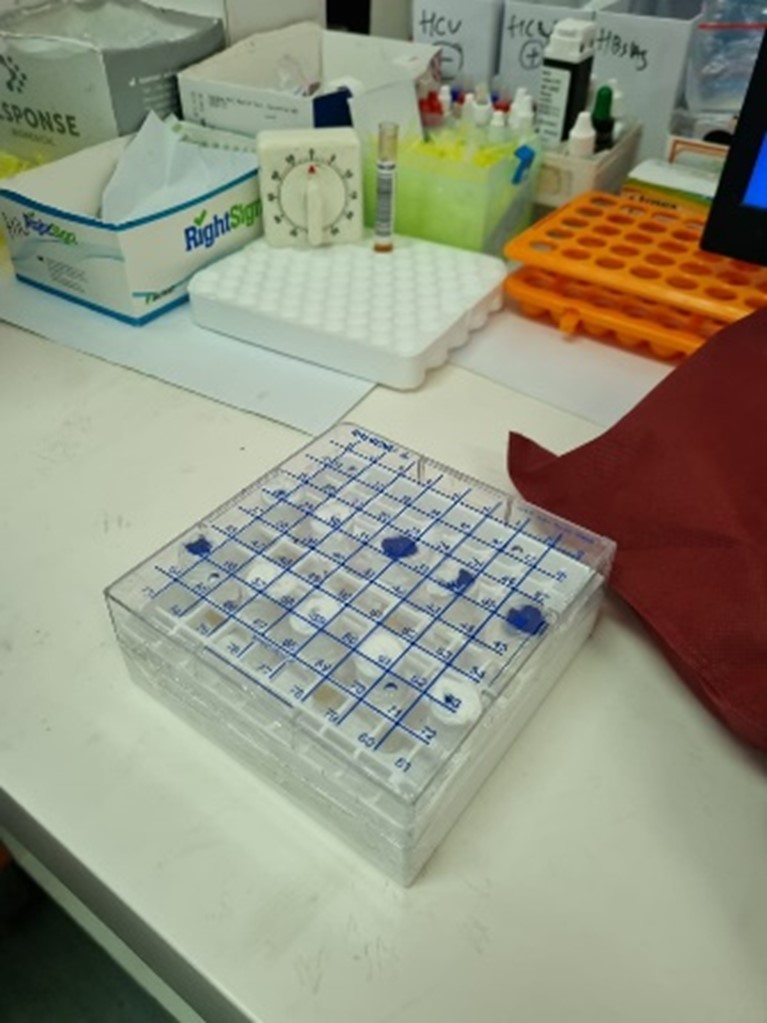In the aftermath of the COVID-19 pandemic, there has been a notable increase from 2022 to 2023 in the number of specimens of MR suspect cases from 17 829 to 25 893. Out of all received specimens in 2023, almost a third are still in the specimen testing pipeline, mainly due to the surge in suspect cases during the first quarter of the year. To prevent further delays in testing, the country’s laboratory network for MR testing needs to be expanded. This will allow Indonesia to enhance its MR case detection capacity. The expansion requires a comprehensive assessment and quality assurance programme to ensure these new facilities adhere to global standards.
To guarantee detection accuracy and align with regional MR elimination strategies, all MR laboratories within the Global Measles and Rubella Laboratory Network (GMRLN) must undergo annual proficiency testing. The test utilizes panels provided by the International Reagent Resource (IRR) and WHO. Currently, Indonesia has seven laboratories in the GMRLN, consisting of four national laboratories and three sub-national laboratories (see figure 1).
Figure 1. Distribution of national and sub-national MR laboratory in Indonesia
To uphold the standards of MR specimen testing in each lab, those in the GMRLN regularly participate in the external quality assurance programme, with a minimum score requirement of 90%. In 2022, Indonesia achieved remarkable 100% across all GMRLN laboratories.
In 2023 Indonesia is committed to expanding its laboratory network, aiming to enhance the country's MR surveillance capabilities. This expansion involves establishing additional facilities to identify MR cases and hospitals for detecting congenital rubella syndrome (CRS). As part of the expansion, the national MR laboratory network is tasked with developing in-country proficiency testing panels aligned with global standards. This is one of the attributions in expanding the lab, as well as receiving accreditation and national and/or international recognition.

MOH visited the Loka Penelitian dan Pengembangan Aceh to observe the laboratory equipment for measles and rubella testing. (Credit: MOH/Mursinah)
Reviewing incoming sample testing logbook and a summary of the results in Balai Laboratorium Kesehatan dan Kalibrasi (BLKK) Yogyakarta (Credit: MOH/Suboko)
WHO has been actively supporting the expansion of new facilities, including facilitating training in Australia for virologists from the Prof. Sri Oemijati National Reference Laboratory to develop MR proficiency testing panels. As a follow-up WHO supported the inception of in-country proficiency testing panel development. These panels comprised a set of MR and CRS specimens to be evaluated by proposed facilities and hospitals. To prepare and select the specimens, Prof. Sri Oemijati National Reference Laboratory conducted site visits to BBLK Surabaya, BBLK Makassar, and BLKK Yogyakarta in July and August 2023.
The proficiency testing panel for the quality assurance programme (QAP) in Adam Malik hospital (Credit: MoH/Bie Novirenallia Umar)
Subsequently, the panels were sent to six facilities for QAP, namely Labotarium Kesehatan Daerah (Labkesda) DKI Jakarta, Balai Besar Teknik Kesehatan Lingkungan dan Pengendalian Penyakit (BBTKLPP) Jakarta, Balai Besar Teknik Kesehatan Lingkungan (BBTKL) Banjarbaru, BBTKLPP Yogyakarta, and BBTKLPP Surabaya. These facilities received measles and rubella proficiency testing panels. In addition, Adam Malik hospital in Medan received proficiency testing panels for congenital rubella syndrome. By October 2023, these facilities had completed two proficiency testing, with all achieving a score of 100% in each test. These outstanding results demonstrate that these new labs have fulfilled two of the three mandatory steps for establishment.

Discussion between the MOH and laboratory personnel in Balai Besar Laboratorium Kesehatan (BBLK) Surabaya (Credit: MOH/Ratna Handayani)
To bolster virologists’ capacity in the national measles laboratory network, WHO and MOH organized a meeting on 4–6 September 2023, gathering 59 virologist nationwide. The meeting covered the global and regional progress on MR elimination and the laboratory network by WHO, national regulations and updates on MR and CRS surveillance by the MOH, and the roles of the national laboratory network in MR elimination by the Vaccine Preventable Diseases Surveillance Expert Committee. Furthermore, the attendees also received six overarching recommendations from the Ninth South-East Asia Regional Meeting of Virologists of the Measles and Rubella Laboratory Network that covers serology capacity, molecular surveillance, quality assurance and accreditation, and good laboratory practices. The meeting also highlighted an exemplary effort from Thailand in establishing and strengthening at subnational laboratory networks.

A national meeting to strengthen the quality of the measles laboratory network in Indonesia on 4–6 September 2023, involving the MOH, WHO, and vaccine preventable diseases (VPD) Surveillance Expert Committee (Credit: MOH/Lisna Wati Putri)
In 2023, Indonesia witnessed a significant rise in suspected MR cases compared to previous years, largely due to the immunity gap stemming from the COVID-19. This upsurge emphasizes the need to expand MR laboratories as a critical step in strengthening Indonesia's MR surveillance and ensuring prompt testing. Nonetheless, it is essential that each laboratory maintains high standards of quality. Initiating the development of in-country proficiency testing panels not only guarantees the accuracy of MR testing but also lays the groundwork for the expansion of the MR laboratory network in Indonesia. Ultimately, this will contribute to achieving the MR elimination goals by 2026.
The next phase for the new MR laboratories involves parallel testing, where MR specimens will be sent to Prof. Sri Oemijati National Reference Laboratory in Jakarta for cross-verification. This additional step aims to validate the quality of the new facilities before their authorization and integration into the national MR laboratory network. As for laboratories within GMRLN, annual proficiency testing panels will be consistently maintained to uphold the quality of these facilities. WHO will continuously support the MOH by facilitating proficiency testing panels from IRR for GMRLN laboratories and assisting in the in-country development of proficiency testing panels.
This activity was generously supported by the Australian Government.
Written by Joshua Harmani, National Professional Officer for Vaccine Preventable Diseases Surveillance, WHO Indonesia.






